You are here
Biography
I like the name I was given, I like the surname DOGA, which has a classical Latin root (“doga” in Latin means an oak species or a decoration on the clothes of the nobility), and even the fact of my coming to this earth in time. I was born on the first day of spring, 1937, under the sign of the sun, warmth and rebirth.
Eugen Doga
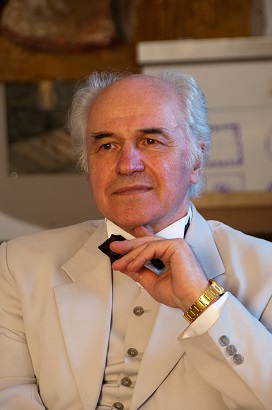 Eugen Doga was born on March 1, 1937 at the dawn of the ritual festival of Mărțișor in the village of Mocra, Rîbniţa district, situated on the left bank of the Dniester, in picturesque northeastern Moldova.
Eugen Doga was born on March 1, 1937 at the dawn of the ritual festival of Mărțișor in the village of Mocra, Rîbniţa district, situated on the left bank of the Dniester, in picturesque northeastern Moldova.
Doga’s native village is located in a valley with a small unnamed creek flowing in the middle of it; there are famous codri over the hill – woods with huge oaks, maples, ash-trees and other vegetation, which has remained as a vibrant and delightful memory, because this is one of the first life discoveries of a fragile young soul. And who knows – where do the creative rethinking of the first contact with nature begin, which can constantly revive, surprise and attach all that lives and has a mind.
Little Jenya liked walking with his mates in spring-time and gathering sorrel, since in hungry and cold postwar times it was a basic food along with a variety of berries. Occasionally there were mushrooms served at table, roasted in sunflower oil in a round pot by Jenya’s mother.
He also remembers a folk music orchestra - taraf - from somewhere, and a symphony orchestra from Chisinau. A whole incident happened to it. The stage of the old country club was small, and the club itself was merely a name. This large symphony orchestra was located on the stage but most of it, including huge violins – outside, in the street. Only later Jenya learnt that these were not violins, but contrabasses. They were playing something for a long time and someone in front of them was always threatening them with a stick. It was very interesting: how was it possible to play for such a long time with no one dancing!
Curious children would sneak up on these violins and touch them with their hands. The violins seemed to be something from another world. Jenya, who had just graduated from a rural seven-year school, soon had to rediscover this "another" world.
EDUCATION
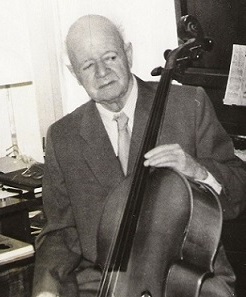 Eugen Doga graduated from Chisinau College of Music (1951-1955) and Chisinau Conservatory (1955-1960.), a class for cello.
Eugen Doga graduated from Chisinau College of Music (1951-1955) and Chisinau Conservatory (1955-1960.), a class for cello.
Until this day he has very fond memories of his cello teacher Pablo Giovanni Baccini. His selfless love for music and personal example had had a great influence on shaping up and directing the future destiny of the composer.
"My teacher, the Italian Giovanni Pablo Baccini, has taught me since I was 15 years old to work hard every day. Every day, including weekends and holidays, I came to class at six o'clock, and he was already sitting at the piano. I have maintained this habit until now: I get up no later than 5.30 am. He became my salvation, because prior to his class I was tormented by another teacher who in a year did not teach me to at least bow the strings. I always think of him with joy,” - says Eugen Doga.
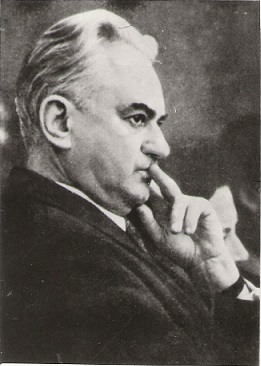 But a sudden trouble - left-hand paralysis - interfered with his musical career. Then Eugen Doga decided to go in for composing music and entered the Conservatory again (1960-1965), to Professor S. Lobel. In addition to music composing and the theory of music Eugen Doga took a full course of symphonic orchestra conducting.
But a sudden trouble - left-hand paralysis - interfered with his musical career. Then Eugen Doga decided to go in for composing music and entered the Conservatory again (1960-1965), to Professor S. Lobel. In addition to music composing and the theory of music Eugen Doga took a full course of symphonic orchestra conducting.
During his studies for the second higher education degree the future composer combined them with working and teaching. In 1962-63 Eugen Doga taught at the music school "Stefan Neaga". In 1963-67 he taught music theory at the E. Koka Chisinau school of music. At the same time under the leadership of L.Tsurkanu he wrote a textbook on the theory of music, which withstood two editions and is still used by students today. During his studies, Doga also worked as a concertmaster in the orchestra of Mold-TV and radio, and was involved in orchestrating the works of venerable Moldovan composers and semi-professionals. For the love of the orchestra he orchestrated even classics like Grieg, Shostakovich and Khachaturian. It was a great school of orchestral writing in conjunction with studying theoretical works.
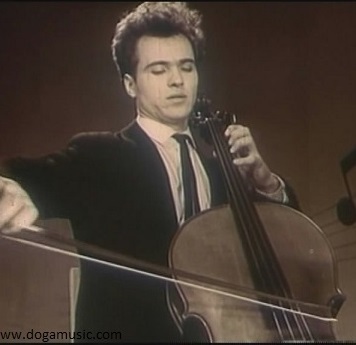 During that period he wrote his first works. He composed a thesis - a vocal-symphonic poem "Mother" based on the namesake print of A.David, First String Quartet (1963, 3rd year), Prelude for Cello and Piano, Scherzo for flute and piano, and other works. On January 1st 1957 for the first time his work "The Christmas Song» (Cântec de anul nou) was performed on the Moldovan radio by a children's choir and orchestra lead by Chico Aranov. In the autumn of the same year his classmate Maria Bieshu had her first performance on the Moldovan television that had just started broadcasting with the song "White Flower of the Garden" (Floare dalbă de liadă) accompanied by the orchestra of TV and radio, in which E. Doga played as well and which was directed by his former teacher Paul Bachinin.
During that period he wrote his first works. He composed a thesis - a vocal-symphonic poem "Mother" based on the namesake print of A.David, First String Quartet (1963, 3rd year), Prelude for Cello and Piano, Scherzo for flute and piano, and other works. On January 1st 1957 for the first time his work "The Christmas Song» (Cântec de anul nou) was performed on the Moldovan radio by a children's choir and orchestra lead by Chico Aranov. In the autumn of the same year his classmate Maria Bieshu had her first performance on the Moldovan television that had just started broadcasting with the song "White Flower of the Garden" (Floare dalbă de liadă) accompanied by the orchestra of TV and radio, in which E. Doga played as well and which was directed by his former teacher Paul Bachinin.
The diplomaed composer worked in various fields of culture:
- Musician in a radio orchestra;
- Music editor at a publishing house;
- Lecturer at the College of Music;
- Member of the Repertoire Board of the Ministry of Culture of Moldova (1967-1972);
- Member of the Committee on Science, Public Education, Culture and Upbringing of the Supreme Soviet of the USSR (1989-1991);
- Deputy Chairman of the Committee on Culture of the Supreme Soviet of the USSR.
On January 1, 1958 Eugen Doga’s music was first aired on the Moldavian radio. It was "New Year Song", written on the lyrics by Ion Grosu, performed by a children's choir. During his years of teaching at the College of Music, Eugen Doga worked on a textbook on the theory of music, which was soon published.
In 1963 he wrote his first string quartet, and then, with 10-year intervals - the second, the third and the fourth. In 2003 Doga wrote his fifth quartet. "Every ten years I write a quartet, - says the Maestro, - notably, this happens just right in October. You change a little and have new feelings over this period of time. And each new quartet is different from the previous ones". The composer plans to write ten quartets and invite everyone to the premiere of the tenth one.
FAMILY
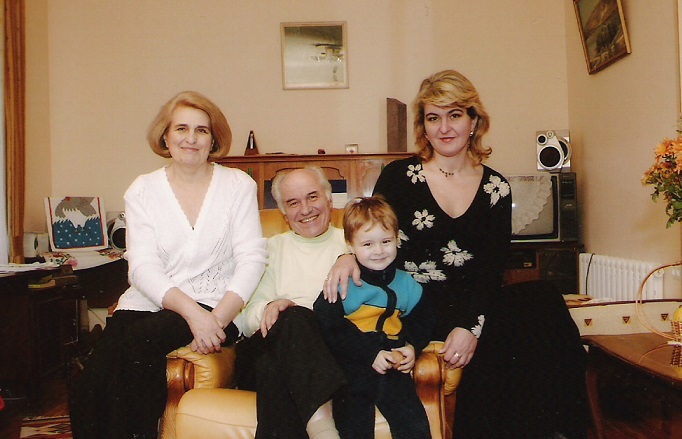
Fate favors Eugen Doga, and his wonderful family is the evidence of this. The composer’s wife, Natalia Pavlovna Doga, is not only his "guardian angel" but also a researcher and a careful collector of creative works by the Maestro.
Eugen Doga’s daughter’s name, Viorica, has two meanings - it is translated from the Romanian language both as "violin" and "violet". Viorica didn’t choose the musical path to go, but she lives up to her name by becoming a director of documentaries on environmental issues. This is not surprising because a violet likes a clean environment.
Every day one of the Moldovan TV channels opens with the music by Maestro Doga. In 2001 his music was for the first time played for a little boy - the composer’s grandson, Dominic Dimitriu Doga, who was born in spring as well.
TODAY
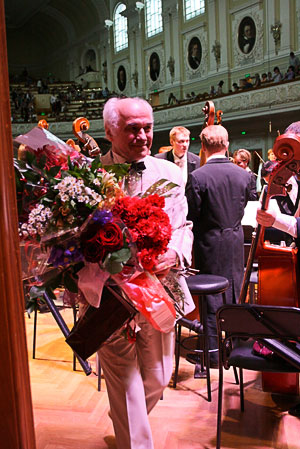 At the end of the century, in 2000, the Czech Television decided to make 13 documentaries under the title "The Poets of the Epoch" devoted to the prominent artists of the 20th century. Eugen Doga is the 9th in this list. In spring 2000, Czech director Yuri Vondrak made a 29-minute program about Eugen Doga which covers the one whole day in the composer’s life. The film turned out to be a kind of a blitz-portrait at the turn of the centuries. The premiere of the film was in winter, 2000, in Brno and Prague (Czech Republic); actually, it was the first documentary film telling about the life and work of composer Eugen Doga.
At the end of the century, in 2000, the Czech Television decided to make 13 documentaries under the title "The Poets of the Epoch" devoted to the prominent artists of the 20th century. Eugen Doga is the 9th in this list. In spring 2000, Czech director Yuri Vondrak made a 29-minute program about Eugen Doga which covers the one whole day in the composer’s life. The film turned out to be a kind of a blitz-portrait at the turn of the centuries. The premiere of the film was in winter, 2000, in Brno and Prague (Czech Republic); actually, it was the first documentary film telling about the life and work of composer Eugen Doga.
In our difficult times composer Eugen Doga manages to keep for himself a part of the huge spiritual space which created him and goes on "feeding" him. Maestro, in his turn, selflessly pays a tribute to the society with true "golden coins" - as his melodies, having crossed all the boundaries, are travelling around the world freely, and nowadays, in the new century, keep on exciting and rejoicing many people on the planet by purifying and harmonizing their souls.
In 2012 Eugen Doga established the International Fund “Dominanta”. Its mission is to facilitate the actualization of creative and spiritual principles of composers. This is to strengthen and develop the cooperation in the field of musical art, to reserve and develop cultural values, to participate in various national and international creative projects, to cooperate with government and non-government organizations and so on.
On January 18, 2014 the salon “Eugen Doga” opened its doors. This was an old dream of the composer – to create a Music Salon which would bring together musicians, politicians, artists, business people, and like-minded people and hold musical evenings. The main objective of the Salon is to bring together people in our disparate world through art and communication.
"I want to bring together at the Salon nice and like-minded people, because we are all very disconnected, and a common soulful state of mind tends to pull us together," – noted Eugen Doga.
Maestro Eugen Doga always strove for new horizons, continued to write new music, and considered himself an eternal student.
Eugen Doga left this world on June 3, 2025 at the age of 88.
National mourning was declared in Moldova on the day of the funeral.
Eugen Doga is buried in the Central Cemetery in Chisinau.
1997-2017 (c) Eugen Doga. All rights reserved.




